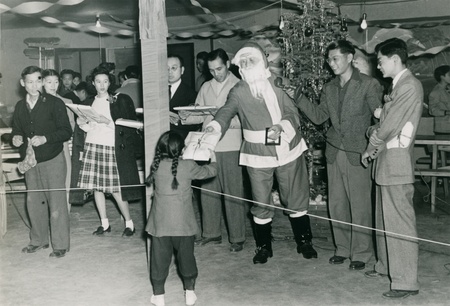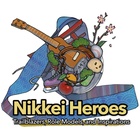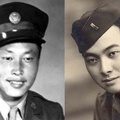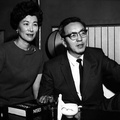“Nikkei Heroes,” the theme of the JANM's Discover NIkkei project, to capture stories about Japanese American trailblazers, role models, and inspirations has featured many Nikkei heroes from the Issei to current generations. Many of the stories are about people who would never consider themselves as trailblazers or role models.
I previously wrote about some of my heroes such as Senator Daniel Inouye, George “Joe” Sakata, and my father, Bill Hosokawa. While searching my memories of my childhood at Heart Mountain Relocation Center and afterward, I have memories of “Hakujin Heroes” such as Ross Wilbur and Pauline Lynam.
* * * * *
It had been arranged that my parents and I would be released early from Heart Mountain and begin life in Des Moines, Iowa. The Des Moines Register newspaper had given my father a job and served as a sponsor. At the train station, we were met by Ross Wilbur, a member of the Quakers that had a resettlement program helping internees re-enter life outside of barbed wire. Their resettlement work has continued to assisted other groups such as refugees.
Ross had found a rental unit that would be our start in Des Moines. I believe that transitions commanded by EO 9066 to assembly centers to relocation centers to re-entry into communities was difficult if not traumatic and the work of the Quakers and similar groups deserves recognition. His memory remains as one of my “Hakujin heroes.”
* * * * *
After settling into work and the community, we had enough resources to buy a small house. The sentiment against the returning internees who looked like the enemy while real Americans were fighting was generally negative and even hostile. The war had not ended and we were moving into a neighborhood. Would we encounter signs such as “Go Home Japs” and “No Japs?”
The neighborhood on 32nd Street was neat and quiet and standing in the driveway was a diminutive lady with wire rim glasses and hair pulled into a bun. Pauline Lynam might have been in her late 30s or early 40s, but appeared elderly to a four-year old. She welcomed us, especially me. She had prepared our house with some food basics. Pauline was a pharmacist. Her husband, Ronald, was a publisher's representative and sold school books in the Midwest states.
Unknown to us, Pauline had met individually with the neighbors to tell them about the family moving into the house next to hers. She explained the relocation of the Japanese Americans and how these people are true Americans. Neighbors had nothing to fear. This activity did not stop as Pauline, my mother and I attended a lot of tea and cookie meet and greet parties.
My maternal grandmother Miyake lived with us. A widow living in Portland, Oregon at the time of Pearl Harbor, she ran a small Japanese language community newspaper. She managed a living with the newspaper and teaching music. The FBI arrested her on suspicion of espionage because of the newspaper was printed in a foreign language. She was imprisoned in Texas. Not long after being imprisoned she became ill and was diagnosed with Hodgkin disease. The government wanted nothing to do with a prisoner with cancer and released her to have her join us in Heart Mountain and Des Moines.
Not long after settling in the neighborhood, she died either of the cancer or the horrible drugs used at that time. Pauline shooed us over to her house and she prepared the body for the funeral home, cleaned, and laundered and was a comfort to my mother.
My most keen memory was a fall day when a group of neighborhood boys came to invite me to play. What a thrill. I asked my mother who told me dinner was being prepared and I should stay home. Disappointed and likely angry, I sneaked out and joined the boys across the street in a wooded area. My first playmates. They had an assortment of guns and they would teach me how to shoot a gun, but first I had to stand in front of a tree. At four years old, I pretty much understood what, “Shoot the Jap kid” meant and I should run. Shots rang out behind me as I ran home in terror. I hid in our old wood garage, shaking in fear and wondering how to get back into the house.
Pauline came into the garage. I suspect she was aware of the activities that had taken place, at least heard the shots from what must have been a 22 rifle as well as pellet and bb guns. She said I should come to her house. She would call my mother and tell her we were visiting and she would send me home when dinner was ready. As far as I know, my parents never knew. I suspect Pauline might have had some meetings with neighborhood parents.
Pauline became my grandmother. We did many things together. Her ice cream made in an old wooden crank ice cream maker was our special weekly project.
We moved to Denver when my father joined the Denver newspaper. Growing up, I thought of Pauline each year when she sent a birthday card with a dollar bill. At mid-career, I joined the faculty at the University of Missouri and still received my special birthday greeting from her. We visited several times. She became frail and forgetful. She passed away maybe in her 90s and she will always be my “Hakujin hero.”
* * * * *
My third group of “Hakujin heroes” likely number in the tens of thousands. This heroes story appears in some of my father’s books, but was special to me when it appeared as an editorial in the Denver Post, 1977, when my father was editor of the editorial page. In summary, it began:
Dear Mike:
You were a small part of a dramatic Christmas experience. You were very young and may not remember the details, so let me tell you the story now. It was the Christmas of 1942, just 35 years ago and not a happy time for a world at war. It was a particularly depressing period for your mother and me, who, along with you and 10,000 other people, were living in a place called Heart Mountain, Wyoming. This community was made up of row on row of black tarpaper-covered barracks. It was surrounded by barbed wire and guarded by soldiers so we couldn’t get out.
We were there because our country, in its infinite ignorance, figured we could not be trusted to be loyal because our forebears had migrated to the United States from Japan.
The government suspended our constitutional rights and forced 120,000 of us Japanese Americans out of our homes and into 10 concentration camps in the desert West.
Out of our barracks window, we could see only gray sand, scudding gray clouds, gray sagebrush that stretched to the gray horizon. Gray wallboard on four walls and ceiling of our cubicle, a floor of gray with the desert dust ground into it. The grayness permeated the air, we were lonely in the midst of the 10,000. It was the hollow, numbing feeling of being outcast, unwanted and forgotten.
On Christmas Eve we went to the mess hall for a party. It was crowded with children and their parents trying to be cheerful and song-leaders struggling to whip up the Christmas spirit. The crowd warmed up joining in singing the carols we had learned as children in a happier day.
Then came Santa Claus, riding in a government truck. Many of the children were too young to remember previous Christmases, and here was a real live Santa Claus with a great bulging sack on his back. The gifts were passed out, and there was one for everyone from the youngest child to the oldest grandmother. There were books and toys and games, pictures to hang in bleak barracks walls, wash cloths and toilet soap, trinkets and useful gadgets, all of them poured into the desert camp by the great, generous heart of fellow Americans who had heard of our plight.
Cards from the donors were enclosed with the gifts. They came from the Joneses, the Smiths and the Browns, and other folks whose names indicated they probably came to America with earlier or later waves of immigration. The gifts were from Billings, Mont, and Boston, Mass; from the mountain town in New Mexico or a class of first graders in Florida.
The grayness left the camp that night and never really returned. It wasn’t due to the presents. They were symbols to remind us that we no longer were forgotten exiles in our native land. They--the American people--remembered us, and had let us know this with an outpouring of affection from cities and hamlets the country over.
I have never forgotten that night, nor the goodness in the hearts of the people who make up our nation. Nor should you forget that the warmth of America’s concern for people in trouble epitomizes the true Christmas spirit.
Have a Merry Christmas.
Dad

These are my “Hakujin heroes.” As a child, my mother told me that “Hakujins” could not be trusted. I am sure she did not believe in such a generalization and I am equally sure she had some degree of post-traumatic stress disorder as did many of the survivors of the camps. Dr. Donna Nakata at the University of Michigan has published extensively on the psychological effects of the camp experience.
© 2019 Michael Hosokawa





